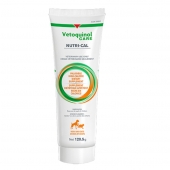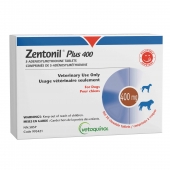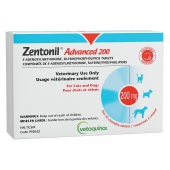Scratching is part of your pet's life
All animals scratch themselves on a daily basis. However, itching can become a real issue for pets and pet owners when it becomes excessive or persists for weeks or even months on end.
Getting to the source of the itching as quickly as possible will help you obtain relief for your pet and avoid secondary complications.
What is pruritus?
Pruritus is the medical term for the sensation of itchy skin. In cats and dogs, pruritus mostly manifests in scratching, gnawing or excessive licking. It can be localized to just one area of the body, or it can be generalized, extending from tip to tail. Depending on the severity of the itching, animals can develop complications (skin infections, ear infections, etc.), which can make the situation worse.
Pruritus is not disease specific but rather a symptom that can be associated with a number of health problems. Properly identifying the cause of the itching is key to being able to provide relief.
What are the potential causes?
There are many causes of pruritus in animals. Outlined below is an overview of the most common causes of itching of the skin.
External parasites
Everyone has heard of fleas but many other parasites can also live on our animals’ bodies, such as walking dandruff, sarcoptic mange, ear mites and lice.
Moreover, just because an animal is not scratching itself does not mean that it is parasite free. Parasites can be inadvertently discovered during a routine check-up with your veterinarian.
Seasonal and environmental allergies
For animals, seasonal and environmental allergies primarily manifest as itchiness of the belly and sides, ears and/or paws. Depending on the allergen, the situation can be cyclical, meaning it occurs at the same time each year, or persist all year round.
Some breeds are predisposed to developing seasonal allergies that generally develop within the first few years of life. Allergy severity can vary significantly from one animal to another.
More than fifty allergens can affect your pet, including pollen, dust, dust mites, certain types of mould and so forth.
Food allergies
Food allergy symptoms are very similar to those of seasonal allergies. With food allergies, animals are more likely to have pruritus throughout the year since they are exposed to their food every day. A variety of foods can be responsible for food allergies, including beef, chicken, dairy products and certain additives. Food allergies can develop very early in a pet’s life but can also manifest at any time, even with the same diet formulation.
Hypersensitivity reactions or contact allergies
Some animals can suddenly experience highly intense itching after coming into contact with an irritant. These types of reactions are usually localized to just the contact area of the body. When pruritus is caused by a contact reaction, it is often an isolated incident resulting from exposure to a plant or household product, or an insect bite, contact with shampoo, or a swim.
It is important to bring pruritis under control quickly since many animals will develop secondary infections that cause intense scratching.
Anxiety (psychogenic pruritus)
In certain stressful situations or when their owners are away, some pets engage in behaviours aimed at soothing their anxiety. In dogs, this can mean licking their paws, and in cats, excessive grooming. Animals with psychogenic pruritus can give themselves skin wounds or experience shedding.
It can be difficult to diagnose the anxiety behind the itching, since there is no tests that veterinarians can use to confirm this diagnosis.
Other causes
Itchiness in pets can also be caused by other health problems such as various hormonal diseases (hypothyroidism, Cushing’s syndrome, etc.), joint pain, sebum overproduction, dry skin, or skin cancers.
Is it contagious?
Most of the health problems that induce itching are not contagious. However, parasites generally are contagious—either for other pets at home or for humans.
Depending on the parasite, it is often necessary to treat all the animals living under the same roof to eradicate the problem. Moreover, some parasites can survive in a home for several months, thus requiring several treatments, depending on your veterinarian’s recommendations.
When do I need to see my veterinarian?
Depending on your pet’s symptoms, history and the results of a thorough exam, your veterinarian will be able to suggest further tests to determine the cause of your pet’s pruritus. Your veterinarian will then be able to suggest well-adapted treatments to ensure relief.
What treatments will my animal receive?
Depending on the diagnosis, your veterinarian might suggest different medical treatments such as antibiotics, antiparasitic agents or antipruritic medications. These treatments can be prescribed for a brief period in the case of parasites, a skin superinfection or a hypersensitivity reaction.
However, some health problems such as seasonal and food allergies or anxiety can require long-term or even lifelong treatment.
In addition to the treatments proposed by your veterinarian, some products may also be included in the medical plan to relieve the itching.
For example, shampoos or ear cleansing products specially formulated for animals with skin problems can be used as maintenance treatment, along with supplements such as omega-3 that can reduce skin inflammation and help keep their skin healthy.






